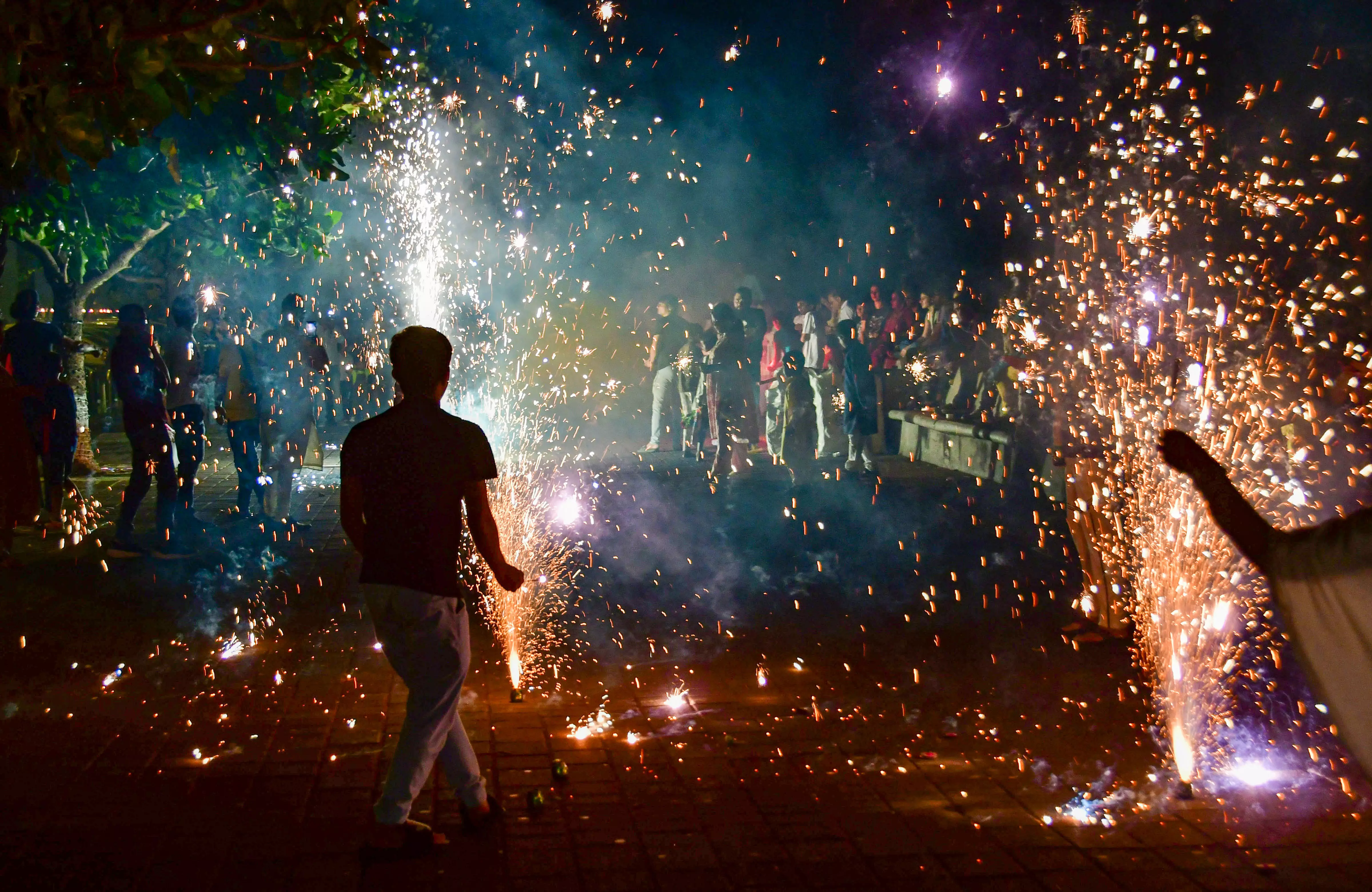
- Home
- News
- Analysis
- States
- Perspective
- Videos
- Education
- Entertainment
- Elections
- World Cup 2023
- Features
- Health
- Business
- Series
- Economy Series
- Earth Day
- Kashmir’s Frozen Turbulence
- India@75
- The legend of Ramjanmabhoomi
- Liberalisation@30
- How to tame a dragon
- Celebrating biodiversity
- Farm Matters
- 50 days of solitude
- Bringing Migrants Home
- Budget 2020
- Jharkhand Votes
- The Federal Investigates
- The Federal Impact
- Vanishing Sand
- Gandhi @ 150
- Andhra Today
- Field report
- Operation Gulmarg
- Pandemic @1 Mn in India
- The Federal Year-End
- The Zero Year
- Premium
- Science
- Brand studio
- Home
- NewsNews
- Analysis
- StatesStates
- PerspectivePerspective
- VideosVideos
- Entertainment
- ElectionsElections
- Sports
- Loading...
Sports - Features
- BusinessBusiness
- Premium
- Loading...
Premium

Defiant bursting of firecrackers by some sections, besides fanning debilitating pollution, is a way to fight what they say is curtailing of Hindu customs
India’s national life is not miserly when it comes to offering evidence of how far removed the country still is from redeeming its tryst with destiny that Nehru spoke of so eloquently on the eve of Independence. The latest instalment attesting to the long distance that remains to be traversed before India redeems its pledge in full measure comes from Diwali crackers, burst by the tonne in defiance of a Supreme Court order against them, a ban by the government, the dark evidence blowing in the air and plain common sense.
Four out of the world’s worst polluted cities are in South Asia, Delhi and Mumbai among them, apart from Lahore and Dhaka. Vehicular pollution, construction dust, fine soil carried aloft by winds sweeping across the Thar desert, industrial effluents, in particular, from power generation and manufacture of cement and steel — these are constant contributors to pollution, without controlling which the problem of debilitating pollution cannot be tackled. Overlaying this perennial pollution is pollution from seasonal and transient sources, such as burning crop stubble in north-west India and the celebratory bursting of crackers and other fireworks during Diwali.
Larger efforts
Reducing the base load of pollution is, obviously, the most significant step. Serious efforts are underway, to source as much power as possible from non-fossil sources, to encourage the shift away from vehicles running on internal combustion engines to ones powered by electricity, and to promote green technologies in manufacturing. Similar efforts are underway to reduce construction dust. These are systemic changes involving large sunk costs that a country like India cannot afford to suddenly convert into stranded assets.
Pollution from burning crop stubble comes at a time when the weather shifts, to lower wind speeds to near-stagnant levels, leading to a pollution overhang, instead of the pollution being distributed across an extended area, reducing the concentration over large towns. Tackling this calls for changes to farm practices and, ideally, emergence of a biogas industry that converts crop stubble from a hindrance to planting the next crop, to get rid of which burning is the most convenient method, to an input for biodigesters that would create an additional income stream for the farmer. This reform entails instilling a behavioural change among tens of thousands of farmers, and the setting up of a technologically advanced bio-digestion industry.
The easiest change to bring about is to stop bursting crackers during Diwali, which also comes up at the time of stagnant winds that make for regional concentration in air pollution — in theory. In practice, people continue with traditional Diwali revelry lit up by the intense flares of assorted fireworks, in neighbourhoods reverberating to the sound of crackers ranging from tiny percussion caps on paper strips that serve as bandoliers for toy guns to so-called bombs that shake buildings and induce an unwholesome hammering inside the chest.
Why do people burst crackers, when schoolteachers have been preaching the virtue of abjuring them for years, the Supreme Court has ordered their ban, the government has proscribed them, and the generation of smoke and pollution is visible to those who burst them?
At the most obvious level, the inability to enforce an official ban betrays state incapacity. The ability to enforce rules is, for the state, a prerequisite for effective governance. A nation that cannot govern itself cannot redeem its tryst with destiny.
Basic information about the damage air pollution does to children’s cognitive development, to the health of the aged and the infirm, particularly those vulnerable to allergens in the air, is available in the public domain. People who wilfully ignore the evidence and act contrary to the imperative arising from the evidence subsume rationality to other impulses. Societies in which rational thought and action are confined to a minority, while the majority mindlessly follow tradition, however irrational, cannot create advances in science and technology to their full potential.
Cultural insecurity
The creation of pollution that poses a threat to public health at large, for the sake of indulging a transient thrill, privileges one’s own pleasure over the welfare of others. This represents behaviour that elevates individualism as a goal that trumps the welfare of the collective. No nation whose members disparage what the country has done for them and steadfastly refuse to ask what they can do for the country can have much of a tryst with national glory.
There are many who insist on Diwali fireworks as defence of religious freedom and resistance to the alleged repression of Hindu customs in a country where they claim the dominance of alien cultures for centuries, fortified by the politics of minority appeasement since the commencement of electoral politics, has devalued the traditions of the majority. They see, in the sound and fury of proscribed firecrackers, revolt against the subjugation of the soul of the nation by a vacuous secularism that is forever willing to accommodate the rituals of minorities but wants the majority to let go of its own practices.
This mentality, which afflicts a section of the majority, of being besieged in their own nation, is fuelled by electoral expedience but has its roots in cultural insecurity. Blame, in part, colonial education, which axiomatically saw all traditional knowledge as worthless, and created a rupture of the mental universe of those brought up to receive modern education from India’s tradition. That rupture has hindered a systematic assessment of what is living and what is dead in Indian tradition, what is compatible with democracy and should be nurtured, and what conflicts with democracy and should be given up. Equating modernity with westernisation came naturally to the coloniser, but for its persistence, owing to the failure to define the contours of an Indian modernity, we have only ourselves to blame.
The search for cultural authenticity, in such a context of an aborted critical revaluation of tradition, has led to rejection of modernity, equating it with being western, and uncritical regression to unwholesome tradition. This process, too, finds articulation in Diwali crackers.
Removing poverty and ignorance and inequality of opportunity is only one part of redeeming India’s tryst with destiny. Redefining and securing cultural authenticity, while progressing as a nation that dumps a legacy of social oppression, exclusivism and sectarianism, is a vital goal, without attaining which democracy cannot flourish in diverse, plural India.
(The Federal seeks to present views and opinions from all sides of the spectrum. The information, ideas or opinions in the articles are of the author and do not necessarily reflect the views of The Federal.)



